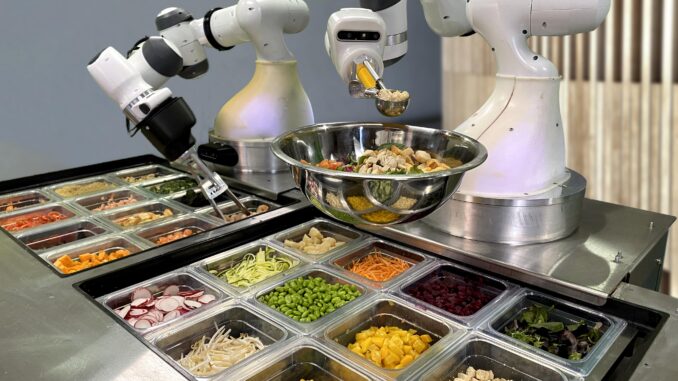
By RTN Staff - 3.5.2020
Artificial intelligence (AI) robotics company Dexai Robotics, which is focused on commercial kitchen automation, announced today that it has raised an oversubscribed $5.5 million seed round.
The Boston-based company currently offers Alfred, a collaborative robot arm that uses utensils to scoop and pick ingredients, reportedly exceeding human capabilities in both speed and precision. Alfred is a plug-and-play solution for quick service restaurants, and can be used to prepare salads, bowls, etc. without any alteration to a restaurant’s layout or recipes.
The funding round was led by Hyperplane Venture Capital. New investors Rho Capital, Harlem Capital, Contour Venture Partners, and NextView Ventures also participated in this financing round. Vivjan Myrto, a Managing Partner at Hyperplane, joined Dexai’s board of directors.
The company will use the funding to expand its engineering, sales, and product teams, allowing it to serve new cuisines and fuel its growth in the foodservice space.
Dexai was born out of a research collaboration in artificial intelligence for robotics among researchers at The Charles Stark Draper Laboratory, MIT, and Harvard. This work, led by David MS Johnson, Dexai’s CEO and Co-Founder, resulted in breakthrough software innovations that enabled robots to control, for the first time, deformable materials such as ice cream, sushi-grade tuna, pico de gallo, etc. At the same time, Anthony Tayoun, Dexai’s CFO and Co-Founder, was pursuing an MBA at Harvard Business School, when he was struck by the huge labor gap in the restaurant industry.
“Each restaurant operator I spoke with complained that their most difficult challenge is finding, training, and retaining staff,” said Tayoun. “We founded Dexai to address the 150,000-person labor shortage in the restaurant industry, so that restaurants can focus on hospitality and, by robots handling repetitive tasks, workforce satisfaction.”
Alfred is billed as the only robot that works in existing kitchens, and prepares meals from different cuisines faster, safer, and more affordably. US consumers’ demand for food prepared outside the home continues to surpass that for food at home, growing at double the rate in the last decade, according to the USDA’s Economic Research Service.
“The restaurant industry faces an acute labor shortage with operators identifying recruiting and retaining employees as their top challenge,” said Michael Kaufman, a Dexai adviser and a past chair of the National Restaurant Association’s board. “There appear to be no signs of that abating. Alfred is an impressive and thoughtfully designed solution for restaurant operators to consider.”
“Alfred can be dropped into existing kitchens because its artificial intelligence software recognizes its surroundings and adapts to the task at hand,” said Johnson. “Because Alfred uses standard utensils, it can make ice cream sundaes for one customer, quinoa bowls for another, and poke for a third. We’re teaching robots how to ‘see’ and identify different objects and foodstuff, and prepare the delicious recipes that people already know and enjoy.”
“Dexai is leveraging the commoditization of robotics hardware and the advancements in machine learning tools, particularly in vision and path planning, to solve real business problems,” said Peter Wurman, Dexai advisor and co-founder of Kiva Systems. “A lot of necessary pieces are coming together to make it possible for affordable robots to perform activities in these semi-structured environments.”
“The Dexai team identified a huge need in the food industry, resulting from shifting eating habits where people eat much more away from the home, and the rise of delivery, evidenced by the rapid growth of ghost kitchens and food ordering platforms,” said Myrto.

